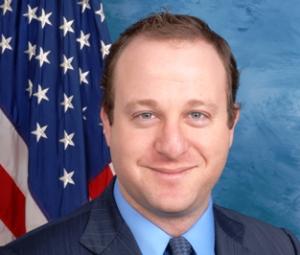Headlines about the "cocaine congressman voting to drug test food stamp recipients" are at best only technically accurate, and miss the support Rep. Radel has shown for compassionate sentencing reform.
New York's attorney general has examined the stop-and-frisk tactics of the NYPD in a new report. Only a miniscule fraction of stops result in an arrest for a serious crime, he found.
The International Narcotics Control Board is "concerned" that Uruguay might actually go ahead and legalize marijuana. But Uruguay doesn't seem to care.
Federal agencies are beginning to work on the banking problem for medical marijuana businesses, the District of Columbia is looking at why its program is so tiny, and New Mexico can't keep up with medical marijuana demand. And there's much more, too.
A quiet week on the corrupt cops front this week. We've got a pill-poppin' New England trooper stealing from the dead and a former New Orleans cop caught trying to peddle dope.
A Maryland gubernatorial candidate and a Maine legislator both call for marijuana legalization, politicians are in trouble for using drugs (at least one of them a bonafide hypocrite for it), and marijuana law reforms appear to be advancing internationally, except in one Australian state. That's just for starters.
Hmmm, on the same day the DEA warns that "marijuana availability seems to be on the increase," hundreds of people apply for licenses to sell pot in Washington state. Times are changing, and somebody needs to let the DEA know. And there's more news, too.
A bill to protect the guns rights of legal marijuana users has been filed, hempsters hit the halls of Congress, a new medical marijuana bill is filed in Pennsylvania, and more.
The future of medical marijuana under Washington state's legalization scheme remains a hot topic, the DEA is banning more new synthetics, there are contradictory signals from Holland, and more news, too.
Years in prison for growing weed in Missouri, life in prison for drug smuggling in Singapore -- we still have a long way to go. There's more drug policy-related news as well today.
One of the top political stories this week was the recent arrest of Rep. Trey Radel, a freshman Republican congressman from Florida. Radel pleaded guilty to cocaine possession yesterday and was sentenced to a year of supervised probation. Last night he gave a press conference to apologize to the country and his constituents and family, and announced he would be taking a leave of absence to pursue counseling and drug treatment.

David Borden
Since the bust came to light, numerous headlines have circulated to the effect of
Radel having voted for legislation to drug test food stamp recipients. But this is only true in a technical sense. As the text of these
articles notes, unlike their headlines, the legislation Radel voted for was an ultimately failed version of the Farm Bill, one of the recurring major federal budget packages authorized every five years. Drug testing was a noxious but small part of the legislation, which also was a mechanism for continuing agricultural subsidies, for continuing the SNAP program itself, and many other things. There were Democrats who voted for the bill too, the roll call shows, some of them liberals who undoubtedly opposed the drug testing provision. Also, the amendment that got drug testing added to the Farm Bill was passed through a voice vote, and there is therefore no record of who voted for or against it. That means that Radel's vote for the Farm Bill could have been consistent with supporting drug testing of SNAP recipients, opposing drug testing, or having no position on it. There is no way to know without delving further. Politicians often have to vote for bills despite there being provisions they don't like, because they want an overall bill to pass.Radel is also one of just three Republican sponsors of the Justice Safety Valve Act, a bill to undo mandatory minimum sentencing by allowing judges to impose sentences below any specified minimums. Although mandatory minimums extend to more issues than drugs, it is drug offenders who are the principle targets of them. So Radel has actually done more than most members of Congress to try to at least reduce the use of incarceration in America, and for drug offenders in particular. A piece published on ThinkProgress.org Tuesday in fact noted a number of statements Radel has made that express skepticism about drug war policies. It also noted that he has expressed opposition to marijuana legalization, so there are facts on both sides. On the other hand, most members of Congress are still likely to say they're not for legalization, despite our movement's recent victories and where opinion polls have gone, so I'm not inclined to attach much significance to that.

Radel news conference, 11/20/13 (TodayNews via YouTube)
That doesn't mean there isn't a valid lesson to be learned from the
Radel arrest. A
Politico article fairly described the incident as "bring[
ing] up drug testing for food stamps." Nancy Pelosi legitimately made this point.
Radel's Republican colleagues who are the main supporters of the drug testing amendment may deserve the hypocrisy charge. But it's less than clear that
Radel does.
More important than piling on a member of Congress who probably doesn't deserve it, but more important in any case, is to make the points that the incident helps to illustrate about the discrimination and injustices inherent in drug war policies -- like drug testing poor people who don't use drugs more than anyone else, and throwing them out the window when they make the same mistakes in their stressful lives that many others who have easier lives make too.
back to top
In a report issued late last week, New York Attorney General Eric Schneiderman analyzed the impact of the NYPD's stop-and-frisk search policies on the state's criminal justice system -- and on the people victimized by them. The results are illuminating, but not pretty.

NYPD practices stop-and-frisk techniques (nyc.gov/nypd)
The report,
A Report on Arrests Arising from the New York City Police Department's Stop-and-Frisk Practices, analyzed nearly 2.4 million stops between 2009 and 2012 resulting in nearly 150,000 arrests. Of those arrests, nearly half led to guilty pleas or convictions at trial, but that is only 0.3% of all those stopped and frisked. Only 0.1% of all stop-and-frisks resulted in a conviction or guilty plea for a violent offense.
"My office's analysis of the city's stop and frisk practices has broad implications for law enforcement, both in New York City and across the state. It's our hope that this report -- the first of its kind -- will advance the discussion about how to fight crime without overburdening our institutions or violating equal justice under the law," said Schneiderman. "The vast amount of data we analyzed over four years should serve as a helpful guide to municipalities and law enforcement officials around the state, where stop and frisk practices are used to varying degrees. I want to thank the NYPD and the Office of Court Administration for providing the data for our report."
Schneiderman was being politic, but his report's numbers speak for themselves:
- Close to half of all stop and frisk arrests resulted in no convictions because the arrestees were never prosecuted, their cases were dismissed, or they received an adjournment in contemplation of dismissal (a dismissal of a charge if the defendant does not commit another crime within six months or a year);
- Just one in 16 stop and frisk arrests -- or 0.3 % of all stops -- led to a jail or prison sentence of more than 30 days;
- Just one in 50 stop and frisk arrests -- or 0.1 % of all stops -- led to a conviction for a violent crime;
- Just one in 50 stop and frisk arrests -- or 0.1 % of all stops -- led to a conviction for possession of a weapon; and
- Almost one quarter of stop-and-frisk arrests (24.7 %) were dismissed before arraignment or resulted in a non-criminal charge.
The report also highlighted the collateral consequences that arrests have for all individuals subject to stop and frisk, regardless of the ultimate outcome of the case, and the burdens that various aspects of the stop and frisk program place on institutional actors within the criminal justice system, including:
- Threats of a possible loss of employment, housing, student loans, and immigration status, even for those charged with misdemeanors, and added incentive to plead guilty; and
- A sharp uptick in litigation costs for New York City for lawsuits alleging constitutional violations by the NYPD. In 2009, for the first time in 30 years, the NYPD had the largest legal settlements of any city agency.
The NYPD's stop-and-frisk policies have drawn intense political fire and judicial scrutiny. Now, they are being subjected to scrutiny of their real world consequences as well. This is an issue where incoming Mayor Bill de Blasio can signal that he's no Bloomberg.
back to top
Uruguay is blowing off the International Narcotics Control Board (INCB) as it prepares to become the first country to legalize marijuana commerce, and the INCB is "concerned." The South American nation failed to send a delegation to Vienna to listen to the INCB complain about its plans.

INCB President Raymond Yans is "concerned" about Uruguay (incb.org)
"The
INCB has noted with concern that the Government of Uruguay was unable to send a delegation to the just concluded
INCB session to discuss the status of the country's compliance with the international drug control conventions," the global anti-drug bureaucrats complained.
The INCB is also "very concerned that the draft legislation currently being considered in Uruguay would, if adopted, legalize production, sale and consumption of cannabis for recreational purposes."
"This would be in contravention of the 1961 Convention on Narcotic Drugs, which has been adopted by 186 countries, including Uruguay," said INCB President Raymond Yans. "Cannabis is controlled due to its dependence-producing potential, and the current development in Uruguay, if pursued, would have serious repercussions for public health, particularly for youth, and would be in violation of the United Nations international drug control treaties."
Uruguay's marijuana legalization bill, backed by President Jose Mujica, has already passed the lower house of parliament and is set for a vote soon in the upper house. Since the governing party has majorities in both houses, passage is seen as extremely likely.
The INCB complained earlier this year when the bill passed the lower house, but that has not deterred Uruguay from moving forward. Neither will this latest volley from Geneva, but the INCB refuses to give up.
"The INCB looks forward to Uruguay resuming its dialogue with the Board at the earliest possible opportunity, prior to further consideration of the draft legislation in the country," Yans said hopefully.
back to top
Federal agencies are beginning to work on the banking problem for medical marijuana businesses, the District of Columbia is looking at why its program is so tiny, and New Mexico can't keep up with medical marijuana demand. And there's much more, too. Let's get to it:
NationalOn Tuesday, a US Treasury official said the department is discussing banking for medical marijuana businesses with the Justice Department. Access to banking services has been a major roadblock for marijuana businesses, but the Obama administration has signaled it is willing to try to reach a workable solution to the problem.
Arizona
Last Friday, a judge ruled that the state's medical marijuana law did not limit the health care rights by preventing those living less than 25 miles away from a dispensary from growing their own medicine. Judge Katherine Cooper throw out the challenge from two men, but she said they may be able to try again by arguing that the 25-mile rule amounts to a violation of their rights under constitutional provisions guaranteeing everyone equal protection of the law. She said, though, they have yet to make a case for that claim.
California
Last Thursday, the city of Los Angeles filed suit to block a Mar Vista dispensary from opening. The suit claims the business would violate voter-approved rules for marijuana dispensaries because its proximity to a residential neighborhood and seeks penalties of up to $2,500 a day for anyone involved in operating a dispensary at that location.
On Monday, the city of Jurapa Valley said it had filed lawsuits against five dispensaries. The suits seek to force the dispensaries to close. The Riverside County community wants to shut down all dispensaries within its jurisdiction. The lawsuits follow sternly-worded letters sent out in September 2011 and again last summer warning dispensary operators of possible actions against them.
On Tuesday, Santa Cruz County supervisors grappled with cultivation rules for medical marijuana grows. The supervisors had already set new rules for dispensaries in unincorporated areas of the county and are preparing to vote December 10 on cultivation rules. The proposed rules would limit personal grows to 100 square feet, but allow up to 3,000 square feet in rural areas.
Also on Tuesday, the Richmond city council agreed to allow a dispensary to relocate to East Richmond. The Green Remedy Collective needed to move because its landlord is facing foreclosure, but wanted to move to a location zoned general use, which violates the city's guidelines. The city waived the zoning requirement.
Also on Tuesday, the Whittier city council voted to ban dispensaries. The ban passed 4-1 after several community and religious leaders spoke against allowing the outlets, claiming they have harmful effects on families and adolescents. The action was prompted by the approaching date for the expiration of the city's moratorium on issuing permits for medical marijuana dispensaries. The council imposed a 45-day moratorium on medical marijuana dispensaries in January 2012; it has renewed the moratorium twice. The current moratorium is set to expire January 24, 2014, and it cannot be renewed.
Last Friday, the city of Santa Ana sent warning letters to all dispensaries in the city saying they must close by the end of the month or face $1,000 a day fines and misdemeanor criminal charges. The city has a dispensary ban in place, but activists there have managed to place a referendum on the November 2014 ballot that would allow dispensaries to operate.
District of Columbia
On Tuesday, news came that Mayor Gray has convened a Medical Marijuana Advisory Committee to assess current policies. The move comes amidst complaints that strict restrictions on eligibility for the District's medical marijuana program are preventing patients from taking advantage of it. An Intergovernmental Operations Subcommittee will monitor the effectiveness of the current medical marijuana program, and a Scientific Subcommittee will review applicable scientific research. Both subcommittees will review the practices of other states. Only 59 patients are enrolled in the program in the District and only 39 doctors are currently licensed to recommend medical marijuana.
Massachusetts
On Tuesday, the Brookline town meeting cleared the way for a dispensary to open there. The meeting passed three warrant articles designed to set up a licensing framework for medical marijuana businesses. Dispensaries must be at least 500 feet from a school.
Nevada
On Wednesday, the Reno city council approved a moratorium on dispensary business license applications. Las Vegas passed a similar temporary moratorium in September. Reno officials said they were waiting for the state to set final dispensary regulations before the 2013 medical marijuana law goes into effect on April 1.
New Jersey
On Monday, the state's third dispensary began accepting patient registrations. Garden State Dispensary (formerly known as Compassionate Care Center of America) is opening in Woodbridge, although when that will actually happen is not yet certain. Some 1,500 patients and caregivers have registered with the state program, which has gotten off to an excruciatingly slow start.
New Mexico
On Saturday, a survey of medical marijuana producers and patients found that demand is outstripping supply. New Mexico producers have had to turn away thousands of patients in recent months and ration supplies to others, the report found. The number of licensed producers has dropped from a high of 25 to 23, while the number of active patients certified to buy medical cannabis hit 10,289 as of the end of last month, according to state officials, increasing by 1,200 from earlier this year.
Oregon
Last Friday, the Tualatin city council voted to ban dispensaries. The town follows the lead of Medford, but both localities may be in conflict with Oregon's new dispensary law, which leaves regulation up to the state, not localities.
Pennsylvania
On Monday, medical marijuana supporters rallied at the state capitol in support of pending legislation that would allow for the use of medical marijuana by patients, including children. Senate Bill 1182, sponsored by Sens. Daylin Leach (D) and Mike Folmer (R) is the first bipartisan medical marijuana legislation in the state.
West Virginia
On Wednesday, the first details of a new medical marijuana bill emerged. An interim meeting of the Joint Health Committee heard from counsel Charles Roskovensky that the bill he is drafting for them would allow people with certain illnesses like cancer and glaucoma to possess up to six ounces of marijuana. If the bill becomes law, registered patients would be able to purchase medical marijuana at five 'compassion centers' throughout the state that would be chosen through a competitive bid process, he said. Registered patients would also be allowed to have a limited number of 12 marijuana plants. But Roskovensky said the bill wasn't yet in final form, and he solicited suggestions from lawmakers.
[For extensive information about the medical marijuana debate, presented in a neutral format, visit MedicalMarijuana.ProCon.org.]
back to top
A quiet week on the corrupt cops front this week. We've got a pill-poppin' New England trooper stealing from the dead and a former New Orleans cop caught trying to peddle dope. Let's get to it:
In Bridgeport, Connecticut,
a former state trooper rejected a plea bargain and will instead face trial on charges he stole money and property from a motorcyclist killed in a traffic accident. Former Trooper Aaron Huntsman turned down a plea bargain that would have seen him do a year in jail, but now faces up to 10 years in prison if convicted. Huntsman claimed he was strung out on prescription pain pills when he committed the theft, which was caught on his cruiser's camera, and he went into treatment after his arrest.
In New Orleans, a former New Orleans police officer pleaded not guilty Wednesday to violating the federal Controlled Substances Act. Jason Cross was arrested November 1 on charges he conspired to sell drugs in January. Federal prosecutors filed a bill of information rather than an indictment against Cross, suggesting that he is cooperating with prosecutors. He is looking at up to 20 years in federal prison if convicted on the current charges.
back to top
A Maryland gubernatorial candidate and a Maine legislator both call for marijuana legalization, politicians are in trouble for drugs, and marijuana law reforms appear to be advancing internationally, except in one Australian state. That's just for starters. Let's get to it:
Marijuana Policy

Maryland gubernatorial candidate Heather Mizeur wants to legalize marijuana. (wikipedia.org)
. Heather
Mizeur, a Democratic candidate for Maryland governor, Tuesday released a plan to tax, regulate, and legalize marijuana. Under her proposal, marijuana taxes would generate $157 million a year and would go to pay for early childhood education. Click the link for more details.
Maine Legislator Unveils Marijuana Legalization Bill. State Rep. Diane Russell (D-Portland) Tuesday announced she was introducing a new bill to legalize marijuana. The bill, LR 2329, would legalize the possession of small amounts of pot by adults over 21 and impose a 10% sales tax and 15% excise tax on marijuana sales. Russell said the recent vote by Portland residents in favor of legalization sent a clear message to lawmakers.
California Marijuana Legalization Effort Extends Deadline for Input, Amendments. Backers of the Marijuana Control, Legalization and Revenue Act of 2014, the nation's first "open-sourced" legalization initiative, have extended their timeline for further comments on the measure. Backers are holding a series of meetings throughout the state before turning in final amendments to state officials in the first week of December. This initiative is sponsored by Americans for Policy Reform. Another measure, the California Cannabis Hemp Initiative, is already in the signature-gathering phase. Neither has the backing of deep-pocketed donors, who seem to be waiting for 2016 instead.
AMA Passes Resolution Against Marijuana Legalization. Delegates at the American Medical Association's 2013 Interim Meeting Tuesday passed a resolution opposing marijuana legalization. "Our AMA believes that (1) cannabis is a dangerous drug and as such is a public health concern; (2) sale and possession should not be legalized," the resolution says. Note, however, that there is some confusion over the "and possession" language. The draft document cited by the anti-legalization group Project SAM, which touted the resolution's passage in a press release, appears to have the words "and possession" struck through, suggesting that they had been deleted from the resolution and that the AMA might support decriminalization. Project SAM was unable to provide clarification Wednesday, but promised to get back to the Chronicle.
Sentencing Reform
Washington State Defelonization Bill to be Rolled Out Tomorrow. The activist group Sensible Washington is holding a press conference Thursday to formally introduce a legislative proposal to defelonize the possession of personal use amounts of illegal drugs. Speakers will include bill sponsors Representatives Sherry Appleton (23rd Disrict), Joe Fitzgibbon (34th District), Jessyn Farrell (46th District), Luis Moscoso (1st District) and Jim Moeller (49th District), as well as former corrections official and speaker for Law Enforcement Against Prohibition (LEAP), Matt McCally.
Politicians in Drug Trouble
Congressman Busted for Cocaine Possession. US Rep. Trey Radel (R-FL), the congressman arrested last month for cocaine possession, pleaded guilty today and was sentenced to a year of supervised probation. [Ed: An article on ThinkProgress.org suggests Radel may have decent views on drug policy, but there isn't really enough information to know for sure. An update to the article pointed out that he voted for legislation that would allow states to subject food stamp recipients to drug tests. However, that vote actually was for a larger piece of recurring legislation, the Farm Bill, of which the drug testing provision was a small part. The drug testing provision was passed as an amendment sponsored by another Republican legislator, on a voice vote, meaning there is no record as to what Radel's position was on it, or if he had one. -DB]
Toronto's Crack-Smoking Mayor is Foe of Drug Reform, Harm Reduction. Embattled Toronto Mayor Rob Ford, who has belatedly admitted to smoking crack "in a drunken stupor," is a long-time foe of both drug law reform and harm reduction. Ford has consistently supported the criminalization of drug users and scoffed at programs such as clean needles for drug users as "absolutely ridiculous." He's always appealed to law-and-order voters and praises gang and drug sweeps aimed at poor, marginalized groups. He was a loud and vocal opponent of the 2005 Toronto Drug Strategy, which included a proposal that the city support federal marijuana decriminalization. This after he was caught six years earlier with a joint in his pocket when he was busted for drunk driving in Miami. Whether Ford's recent misadventures will prompt (force?) him to change his attitudes remains to be seen. [Ed: Whether it will ever matter again what Ford's views are also remains to be seen.]
International
Dutch Liberals to File Bill for Regulated Marijuana Production. Holland's D66 Liberal party, the second most popular in the country, is drawing up legislation to regulate marijuana cultivation. The measure would address the country's "back door problem," where cannabis cafes are allowed to sell small amounts of marijuana, but cannot legally acquire it. The move comes as pressure is mounting on the conservative coalition government to resolve the issue. Two-thirds of the country's largest municipalities support such a move. The Justice Minister, who opposes legalizing cultivation, has said he will update parliament on the situation by year's end.
Pot Legalization in US Driving Down BC Bud Prices. Marijuana activists in British Columbia say the marijuana legalization votes in Colorado and especially Washington are driving down the prices of the province's trademark BC Bud. Dana Larsen, who runs a Vancouver dispensary and is trying to push a referendum to decriminalize in the province, said his prices had dropped 20%, while Jodie Emery, wife of imprisoned "Prince of Pot" Marc Emery, said pound prices had dropped from $2,000 to $1,000.
Marijuana Decriminalization Clamor Grows in Bermuda. The Bermudan government has already signaled it is willing to discuss the decriminalization of small amounts of marijuana, and now the opposition is making similar noises. The government said in its Throne Speech that it is working on the possibility of decriminalization, and the opposition People's Labor Party Shadow Finance Minister David Burt has replied, saying his party wants the removal of criminal penalties for possession of small amounts, options for the medical use of marijuana on the island, and the regulation of the sale and use of the drug.
South Australia Ready to March Resolutely Backward on Pot Policy. Parliamentarians in South Australia are preparing to amend the state's marijuana laws for the worse. The changes would reduce the amount of marijuana punishable only by a fine from 100 grams to 25 grams, and carrying more than 25 grams would be a criminal offense. The measure would also double the fine, from $150 to $300. There are also plans afoot to increase the penalties for marijuana cultivation.
back to top
Hmmm, on the same day the DEA warns that "marijuana availability seems to be on the increase," hundreds of people apply for licenses to sell pot in Washington state. Times are changing, and somebody needs to let the DEA know. And there's more news, too. Let's get to it:

Crackdowns on pain pills are leading the way to comeback for heroin. (wikipedia.org)
Hundreds Apply for Pot Business Licenses in Washington State. Monday was the first day budding ganjapreneurs could apply for licenses to open marijuana cultivation, processing, and retail facilities, and interest was intense. By 2:00pm Monday, 299 applications had been submitted. The state envisions up to 334 marijuana retail shops opening next year; it is unclear how many production and processing facilities will be licensed, although regulators have said they want to limit cultivation to two million square feet statewide. Applications are being accepted through December 17.
Arkansas Attorney General Rejects Another Marijuana Initiative. The Arkansas attorney general's office Monday rejected the proposed language of an initiative that would repeal the state's marijuana laws. The initiative isn't clear about what it seeks to achieve, the office said. The attorney general's office has been busy with initiatives this year; it has already approved two separate medical marijuana initiatives, and the author of this one can come back with new language if she wishes.
Drug Policy
DEA Releases 2013 National Drug Threat Assessment. The DEA Monday released the annual drug threat assessment, which includes looks at drug use and trafficking trends. The report identifies the illicit use of controlled prescription drugs as "the nation's fastest growing drug problem," warns that heroin use and supply is up, as is methamphetamine, but that cocaine use and supply is down. Also, "marijuana availability seems to be increasing," and synthetic drugs "have emerged as a serious problem in the United States."
New Yorkers to Map Out City Drug Policies on Saturday. New York City residents just elected a self-described progressive -- Bill de Blasio -- as mayor. Now, they will have a chance to let him know what direction they want the city to take on drug policy. As part of Talking Transition, "an open conversation about the future of New York City," hundreds of people are expected to attend a Saturday forum on "Ending the New Jim Crow: Mapping the Future of Drug Policy in New York City," then break into small groups to make recommendations on issues ranging from racially-biased marijuana arrests, lack of effective drug treatment, and overdose prevention strategies. Click on the main link for more details.
Heroin
Ohio Attorney General Declares War on Heroin. Ohio Attorney General Mike DeWine Monday announced he had created a new heroin unit within his office to fight back against what he called "an epidemic" of heroin use. The move comes as heroin overdose deaths have doubled in recent years, from 292 in 2010 to 606 last year. DeWine said his office will spend an additional $1 million a year on increased assistance to law enforcement, community outreach workers, and lab technicians. The rise in heroin use in Ohio comes after Gov. John Kasich cracked down on pain clinics in 2011, leaving illicit heroin as the last resort for people strung out on opioids.
International
China to Turn "Re-Education" Labor Camps into Drug Treatment Centers. At its recent Third Plenary meeting, the Chinese Communist Party announced it was abolishing its controversial "re-education" labor camps. Now, it turns out that the camps won't be closing, but will instead be converted into drug treatment and rehabilitation centers. "The new rehab centers will provide compulsory drug rehabilitation treatment for addicts, and help them find self-confidence again," one official explained. There are 1.8 million "officially registered" addicts in China, but the number of actual addicts could run as high as 12 million.
Canadian Students for Sensible Drug Policy Meets in Vancouver This Weekend. Canadian SSDP is holding its annual national conference this weekend in Vancouver. In addition to panels and speeches, there will be tours of Insite, Vancouver's supervised injection facility, a Downtown Eastside Walking Tour, and rides on the Sensible BC bus. For more details, click the link.
back to top
A bill to protect the guns rights of legal marijuana users has been filed, hempsters hit the halls of Congress, a new medical marijuana bill is filed in Pennsylvania, and more. Let's get to it:

Rep. Jared Polis (D-CO) filed a bill to protect the gun rights of legal marijuana users.
Polis Files Federal Bill to Protect Gun Rights of Legal Marijuana Users. US Rep. Jared Polis (D-CO) last Thursday filed House Resolution 3483 to override a 2011 ruling by the Bureau of Alcohol, Tobacco & Firearms that medical marijuana patients cannot legally buy or own guns. The bill's summary says its purpose is "to amend title 18, United States Code, to provide exceptions from the firearm prohibitions otherwise applicable in relation to marijuana if its possession is lawful under State law."
Washington State Now Taking Applications for Pot Business Licenses. Beginning today, Washington state is taking applications for licenses to grow, process, and sell legal marijuana. The licensing application period lasts 30 days. Under rules drafted by the Liquor Control Board, the state will license up to 2 million square feet statewide for marijuana production and up to 334 retail outlets.
Near Majority for Marijuana Legalization in Wisconsin. A Marquette University Law School poll has Wisconsin hovering on the cusp of majority support for legalization. The late October poll had support for legalization at 49.7%, with 44.9% opposed, 4.7% not sure, and 0.8% who refused to answer.
No Decriminalization in Puerto Rico This Year. Marijuana decriminalization won't happen this year in Puerto Rico. The legislative session has ended without the lower house taking up a decriminalization bill passed earlier by the Senate. Recent polls showing little support for decriminalization and even medical marijuana helped dampen things, but decrim bill sponsor Sen. Miguel Periera said he will reintroduce it in the new session in January.
Medical Marijuana
Americans for Safe Access Forms Virginia Chapter. The national medical marijuana advocacy group is coming to the Old Dominion. The state chapter, Safe Access Virginia, will lobby elected officials to pass a comprehensive Virginia Medical Cannabis Act. The group had its inaugural meeting Saturday in Richmond.
Oregon Committee Reviewing Dispensary Rules Meets Today. The committee charged with drafting rules for medical marijuana dispensaries is meeting in Salem today. It will consider an opinion from the Oregon Legislative Counsel that says regulating dispensaries is the job of the state, not localities. Some localities have already moved to ban dispensaries.
Pennsylvania Medical Marijuana Bill Introduced. State Sens. Daylin Leach (D) and Mike Folmer (R) introduced a limited medical marijuana bill Monday. While the text is not yet available, Leach's remarks suggest that it seeks to allow medical marijuana with a high CBD content that could be used by children suffering from epilepsy.
Hemp
Hemp Lobbyists go to Washington, DC. Led by David Bronner of Dr. Bronner's Magic Soaps, several dozen supporters of industrial hemp were on Capitol Hill Monday urging Congress to lift the federal ban on domestic hemp production. "It's time to grow hemp," Bronner said. "I mean, it's been a long and ridiculous situation."
International
Ireland Stops Anti-Drug Aid to Death Penalty States; Britain Pressed to Do Same. Last Friday, Ireland announced it was stopping "funding to UNODC's Illicit Trafficking and Border Management program because of human rights concerns related to the use of the death penalty in Iran." The British justice reform nonprofit Reprieve is now pressing the UK government to do the same. "Britain is rapidly becoming isolated as the only country which thinks supporting the death penalty machines of Iran and Pakistan is acceptable. Hundreds of people have been sentenced to death in these countries in the last few years for non-violent drug offenses -- helped by millions of pounds of British taxpayers' money. Britain could end this problem tomorrow by putting in place conditions on the aid that it cannot be used to support the death penalty -- why are ministers refusing to do so?"
More Mass Graves in Mexico. Investigators in western Mexico have dug up 19 bodies from a series of eight mass graves after being led to them by corrupt police officers who had been working for drug cartels. More bodies may be coming. They are believed to be victims of turf wars between the Knights Templar and New Generation Jalisco drug trafficking organizations. The corrupt cops were arrested after two federal police were abducted in Michoacan. The missing federal cops are not among the bodies found so far. Meanwhile, in Guerrero, five more bodies were pulled from a mass grave.
back to top
The future of medical marijuana under Washington state's legalization scheme remains a hot topic, the DEA is banning more new synthetics, there are contradictory signals from Holland, and more news, too. Let's get to it:

Amsterdam cannabis cafes near schools will have to close during the day, although kids can't go in them anyway. (wikimedia.org)
Hundreds Pack Washington State Medical Marijuana Meeting. Medical marijuana patients and providers by the hundreds attended a public hearing in Lacey Wednesday, the final day for public comment on state regulators' proposed plans to do away with medical marijuana grows, shutter dispensaries, and reduce the amount of medicine patients may possess. Regulators essentially want to fold the state's medical marijuana program into its new marijuana legalization scheme. Patients and providers are not happy, and they let the regulators know it.
Former New Mexico Medical Marijuana Official to Speak in Iowa. Dr. Steve Jenison, the former medical director of the New Mexico Medical Cannabis Program, will be in Iowa in coming weeks to make presentations about how the New Mexico program works. His visit comes as pressure to institute medical marijuana in the Hawkeye State is on the rise. Jenison will speak in Iowa City on November 19 and Des Moines on December 2. Click on the link for more details.
Synthetic Drugs
DEA Bans Three More New Synthetic Drugs. The US Drug Enforcement Administration (DEA) Friday announced it was banning three new synthetic phenethylamines effective immediately. The drugs are 25I-NBOMe, 25C-NBOMe, and 25B-NBOMe, which the DEA describes as powerful psychedelics linked to at least 19 deaths in the US since March 2012. The ban is an emergency ban, placing them on Schedule I for the next two years, while the DEA and the Department of Health and Human Services move to permanently ban them.
International
Amsterdam Cannabis Cafes Near Schools Must Shut Down During the Day. Beginning in January, all Amsterdam cannabis cafes within 250 meters of a secondary school will have to shut down during school hours, Mayor Eberhard van der Laan said Friday. Thirty-one cannabis cafes will be affected, and the cafe operators' association isn't happy. "This cannot be true," the association said. "It's going to cause problems, and distance from a school is a non-issue. This policy is directed at school pupils but the under-18s don't get into a coffee shop anyway because of the tough controls. But our regulars will have to wait until 18.00 hours."
Most Dutch Municipalities Support Legal Marijuana Cultivation for Cannabis Cafes.Two-thirds of Holland's largest municipalities support some form of government-organized or -legalized marijuana production to supply cannabis cafes, NOS TV reported Friday. That would address the country's "back door problem," where retail sales of marijuana are allowed, but a legal supply for cannabis cafes is not. Justice Minister Ivo Opstelten has said he opposes such a move, but has pledged to update parliament on the situation by year's end.
Czech Medical Marijuana Law Leaves Patients without a Legal Supply. The Czech Republic legalized medical marijuana earlier this year, but the estimated 20,000 patients who would be eligible to use it can't get it legally. Fingers are being pointed at the Health Ministry, which opposes it. The ministry banned insurance companies from paying for it, banned its use by people under 18, limited patients to only one ounce a month, and allows only four strains to be imported by Dutch medical marijuana producers -- at very high prices for a low-income country. But even the Dutch medi-weed hasn't arrived -- it may show up in December -- and when it does, pharmacies still won't be able to sell it until an electronic registry is set up.
Bermuda Public Safety Minister Doesn't Rule Out Marijuana Legalization. Bermuda Public Safety Minister Michael Dunkley said Thursday that while he personally opposes marijuana legalization, he has not ruled out the possibility of legalizing the herb there. His remarks came in the context of rising interest in marijuana law reform in the island nation, where a public debate on decriminalization is set to happen soon. This is the first time a Bermudan public safety minister has expressed the slightest openness to legalization.
Bolivia Increases Size of Legal Coca Grows. The Bolivian government Wednesday set the amount of coca to be grown legally for traditional uses at 14,705 hectares, an increase of 2,000 hectares over previous years. The increase is needed to meet demand for coca for traditional uses, according to the Comprehensive Study of the Coca Leaf. But Bolivia cultivates nearly twice as much coca as is envisioned for traditional use.
back to top
Years in prison for growing weed in Missouri, life in prison for drug smuggling in Singapore -- we still have a long way to go. There's more drug policy-related news as well today. Let's get to it:

Canadian addicts are suing Ottawa over its moves to block prescription heroin.
Missouri Brother and Sister Get 20+ Years for Growing 12 Pot Plants. If anyone still wonders why marijuana law reform is needed, here's why: An eastern Missouri brother and sister, ages 24 and 36, have been sentenced to 22 years and 15 years in prison, respectively, for growing 12 pot plants and eight seedlings. Prosecutors sought the harsh sentences, saying it was a "large-scale" grow and that guns and bullet-proof vests were present in the home. But neither guns nor vests are illegal, and the couple wasn't charged with a weapons enhancement; they got a combined 37 years in prison for growing a few plants.
NORML Endorses Pennsylvania Governor Candidate. The National Organization for the Reform of Marijuana Laws (NORML) has endorsed John Hanger for governor. Hanger is running for the Democratic Party nomination and won NORML's endorsement in part because of his three-point plan to legalize marijuana in the Keystone State by 2017. "NORML PAC is pleased to endorse John Hanger in his campaign to become Pennsylvania's next governor," said NORML Communications Director Erik Altieri. "Mr. Hanger is the only candidate who isn't afraid to openly discuss and campaign on a platform that calls for widespread reform of Pennsylvania's marijuana laws."
Medical Marijuana
I-502 Leader Calls for Medical Marijuana Home Grows to Remain. Alison Holcomb, architect of Washington state's successful marijuana legalization campaign, has called on state regulators to continue allow medical marijuana patients to grow their own. I-502, the legalization initiative, does not allow home cultivation for non-patients, and regulators have proposed ending home cultivation for patients as well, but have run into considerable flak for that and other proposals that impinge on the existing medical marijuana system. Holcomb's statement came Wednesday, the last day for public input on the issue.
Criminal Justice
Virginia's Criminal Justice System Cruel, Ineffective, and Crisis-Bound, Report Says. The Justice Policy Institute released a report Wednesday bemoaning the state of criminal justice in the Old Dominion. The report's title pretty much says it all: Virginia's Justice System: Expensive, Ineffective, and Unfair. While the state has made some recent progress, it "continues to suffer under misguided policies and practices of the past," the report concluded. The report made a number of reform recommendations, including reintroducing parole and reducing the focus on drug offenses.
International
Canadian Addicts Sue for Prescription Heroin. Five Vancouver heroin addicts and Providence Health Care have launched a constitutional challenge to the federal government's ban on prescribing the drug. Health Canada's special access program (SAP) had recently approved applications from BC doctors to give diacetylmorphine (heroin) treatment to about 20 patients who were completing their participation in a Vancouver-based clinical trial -- the first time it had ever done so, but the federal health ministry denounced the decision and immediately changed policies to ensure it was never allowed again.
Mexican Cartel Pays $25 Million a Year in Bribes, Newspaper Says. The Knights Templar (Los Caballeros Templarios) drug trafficking organization in Michoacan is paying nearly $25 million a year to different officials in the state, the Mexico City newspaper El Milenio reported. The group also spends about $5 million a year in bribes in other states where it has a smaller footprint. In Michoacan, federal police commanders are getting more than $25,000 a month, state police commanders are getting more than $18,000 a month, and so are some officials in prosecutors' offices. Journalists are also on the cartel's payroll, with print reporters getting $3,000 a month and radio reporters getting nearly $2,000 a month. The numbers come from an intelligence report made available to reporters.
Colombia's FARC Ready to Deal with Coca Issue. As the leftist guerrillas of the FARC and the Colombian government enter the next phase of their negotiations to end the nearly half-century-old armed struggle there, the FARC's top leader, Timoleon Jiminez, said the issue of illicit drug cultivation, which is next on the agenda, could be addressed, but only in the context of social justice for the peasantry. "We understand that if rural communities are satisfied in their basic aspirations as a result of agreements in dialogs and many negotiation tables taking place in the country, the problem of illegal crops would have disappeared forever in Colombia," he said. "Our satisfaction for a Colombia without coca will be enormous, much more, if the way leads to a Colombia without poverty that can make use of its political rights without any threats and violence." Peace talks resume next week in Havana.
First Singapore Drugs Death Row Inmate Re-Sentenced. The first person to benefit from Singapore's reform of its draconian death-penalty-for-drugs law was re-sentenced Thursday. Yong Vui Kong had been sentenced to death for bringing less than two ounces of heroin into the country, but under the sentencing reform, he was re-sentenced to life in prison and 15 lashes of the cane. The changes allow judges the discretion to sentence a courier to life imprisonment and caning if he is found to have substantively assisted the authorities in the fight against drug-trafficking.
(This article was published by StoptheDrugWar.org's lobbying arm, the Drug Reform Coordination Network, which also shares the cost of maintaining this web site. DRCNet Foundation takes no positions on candidates for public office, in compliance with section 501(c)(3) of the Internal Revenue Code, and does not pay for reporting that could be interpreted or misinterpreted as doing so.)
back to top









